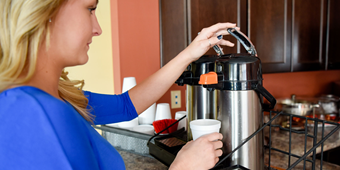Don’t Let Your Thyroid Steal Your Sleep

Find Your Perfect Match
Answer a few questions and we'll provide you with a list of primary care providers that best fit your needs.
Do you lie awake at night, eyes wide open, waiting for the sleep fairy to sprinkle her magic dust? Or, perhaps you’re so tired during the day that you nap and then can’t fall asleep at night.
Everyone experiences occasional daytime sleepiness or a night of bad sleep. When sleep disturbances become the norm, however, it may be time to investigate a medical cause such as thyroid disease.
Your body’s many organs and systems rely on your thyroid gland, located at the base of your neck just below your Adam’s apple. When your thyroid produces too little or too much thyroid hormone, it throws off your body’s metabolism, which can affect your sleep.
Too much hormone production causes an overactive thyroid, or hyperthyroidism. This can lead to anxiety, rapid heart rate and insomnia. You may have difficulty falling asleep and staying asleep, and you may even sleep walk.
Too little thyroid hormone causes an underactive thyroid, or hypothyroidism. This may result in fatigue, lack of energy and excessive daytime sleepiness.
Regardless of what’s causing you to toss and turn, a sleep overhaul might be in order.
Team Up With Your Doctor
Good sleep can be elusive since many different factors can contribute to sleep problems. That long list includes, among others, chronic physical conditions, mental health disorders, neurological disorders and medications.
If thyroid disease is a culprit behind your restless nights, your doctor can determine this fairly easily through a physical exam and blood test. Help your doctor help you by sharing any new or unusual physical symptoms and by keeping a sleep journal.
Tips for Better Sleep

We spend a third of our lives sleeping. Getting sleep right will help increase your productivity, energy and physical and emotional well-being.
Regardless of what’s causing you to toss and turn, a sleep overhaul might be in order. These strategies can help turn your pillow problems into pillow peace:
- Try to go to sleep and get up at the same time everyday
- Get as much natural sunlight as possible
- Avoid bright screens within one to two hours of going to bed
- Move vigorously during the day—don't sit for more than an hour
- Limit caffeine, nicotine, alcohol and big meals at night
- Take time for relaxing activities before sleep
- Create a calm and restful sleep environment
Find Your Perfect Match
Answer a few questions and we'll provide you with a list of primary care providers that best fit your needs.
Source: American Association of Endocrine Surgeons; Helpguide.org




